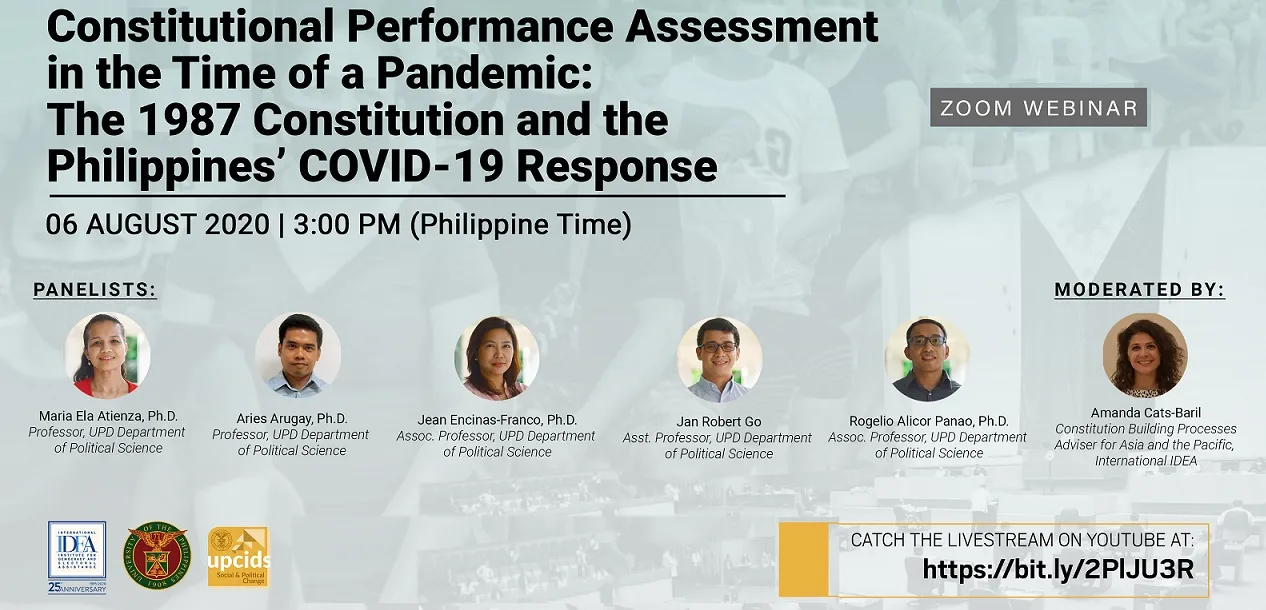Webinar to Examine How the 1987 Philippines’ Constitution is Performing Under Crisis

In the Philippines, the House of Representatives and the Department of the Interior and Local Government are keen on beginning charter change discussions while the country is mitigating the effects of COVID-19. But what changes does the 1987 Constitution actually need? And how has the pandemic exacerbated key constitutional issues and trends?
On 6 August 2020, amidst the COVID-19 pandemic and following President Duterte’s annual State of the Nation Address, International IDEA and the University of the Philippines (UP) hosted a webinar to discuss issues of concern from the recently published Discussion Paper, Constitutional Performance Assessment in the Time of a Pandemic: The 1987 Constitution and the Philippines’ COVID-19 Response.
The Discussion Paper revisited the UP team’s findings from its Constitutional Performance Assessment of the 1987 Philippine Constitution, which applied International IDEA’s methodology for assessing constitutional performance to the Philippines’ context. The research for the new Discussion Paper focused on how the 1987 Constitution’s performance was impacted by the pandemic. The Assessment maps nine constitutional design areas, and the Webinar reviewed each one to highlight how performance was impacted by the pandemic and government response. Panelists also identified areas and trends to watch out for as the Philippine government continues to respond to COVID-19, including positive innovations in governance practices.
The Panelists, all associated with the University of the Philippines Department of Political Science, were: Maria Ela L. Atienza, Ph.D. (Co-Convenor of the UP CIDS Program on Social and Political Change); Aries A. Arugay, Ph.D. (Co-Convenor of the UP CIDS Strategic Studies Program); Jean Encinas-Franco, Ph.D.; Jan Robert R. Go; and Rogelio Alicor L. Panao, Ph.D. The Panel was moderated by International IDEA’s Advisor for Constitution Building in Asia and the Pacific, Amanda Cats-Baril, J.D..
The webinar was attended by members of the academe, advocacy groups, and representatives of government garnering a total of 388 attendees. Specifically, members of the Constitutional Reform (CORE) Movement, a Task Force formed by the Department of the Interior and Local Government, were in attendance and actively participated in the discussion with the panelists. Former Commissioner of the 1986 Constitutional Commission, Dr Florangel Rosario Braid, also joined the webinar and wrote in her Manila Bulletin article that, “documenting these processes in the social, economic, and political life of the nation as they relate to the performance of our Constitution during these times is a significant first step.”[1]
The Q&A opened discussions on how to maintain constitutional performance during periods of emergencies. Other topics covered included proposed constitutional amendments, whether genuine reform can be achieved by shifting to different forms of government or incremental changes to the constitution, and how the constitution can guide the people in seeking government accountability in times of crisis.
The Webinar concluded with hopes that conversations on the constitutional change process may continue, not only with implementors and decision makers but also with ordinary Filipino citizens. While the pandemic has exacerbated underlying constitutional issues, it has also led to new ways of thinking about governing and new practices of ensuring accountability, which could be built upon in the future.



